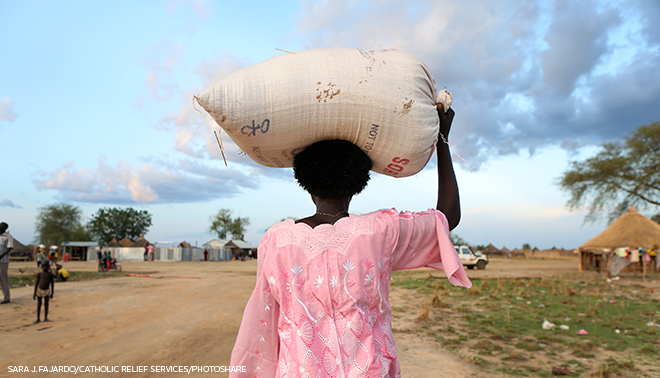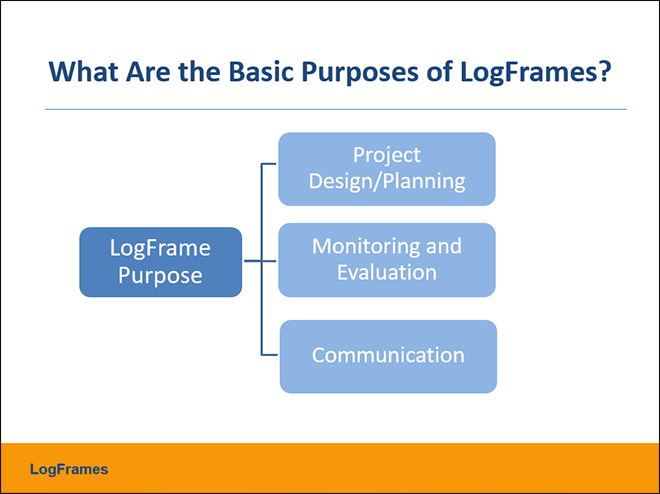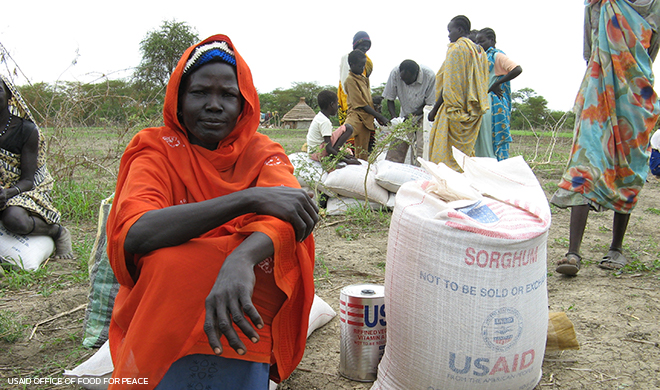
USAID’s Office of Food for Peace (FFP) works to reduce hunger and malnutrition in vulnerable communities around the world through its development food security activities. The FFP awardees implementing these activities must regularly monitor and evaluate their work to make sure they are on track, making progress, and having an impact. FFP developed rigorous monitoring and evaluation (M&E) protocols and approaches to standardize M&E across FFP development activities and promote effectiveness and accountability. To support FFP’s efforts, FANTA has developed, organized, and helped conduct more than a dozen in-country workshops since 2012 to familiarize awardees with FFP’s M&E approaches and requirements and to provide guidance on establishing M&E systems.
The workshops—held in Bangladesh, Burundi, Democratic Republic of Congo, Ethiopia, Guatemala, Haiti, Madagascar, Malawi, Mali, Nepal, Niger, Uganda, and Zimbabwe—were conducted during the activities’ start-up phase and ran from 2 days to 1½ weeks depending on the awardees’ needs. Typically, 15 to 30 participants from the awardee organizations attended. Participants usually included chiefs of party, M&E directors, and M&E staff that the awardees designated for the activities, as well as the awardees’ experts in sectors such as agriculture, health, disaster risk reduction, and gender. Having the chiefs of party participate helped obtain their buy-in for any potential changes to awardee M&E systems or activity design that emerged from the workshop, while sectoral experts helped ensure that any changes reflect sector realities.
Participants said they felt the workshops broadened their understanding of the importance of establishing a sound M&E system at activity start-up and what it takes to develop such a system.
Hands-On Technical Assistance
Over time, the workshops evolved from a more didactic to a participatory approach involving intensive hands-on technical assistance. In recent years, the first 2 days of most workshops included an overview and exercises on essential M&E topics and FFP’s specific reporting requirements. For the rest of the workshop, participants worked in groups to refine the key M&E documents—which serve as the basis for their activities’ design and M&E systems—that the awardees had submitted as part of their FFP proposals. FANTA and FFP jointly monitored the participants’ progress during the technical assistance component, offering suggestions and answering their questions. After the workshops, participants further refined the M&E documents as needed and then used them to prepare M&E plans that their organizations would submit to FFP.

The LogFrame, along with the Theory of Change and Indicator Performance Tracking Tables, lays the foundation of an activity’s M&E system.
Topics covered during the workshops included:
- FFP M&E and reporting requirements: These are linked to an activity’s key life cycle stages—such as the proposal stage, start-up, mid-term, and the activity’s end—and include information that must be reported annually.
- The following essential documents that lay the foundation of an M&E system for an activity:
- Theory of Change: This describes outcomes—including those outside the activity’s purview—that are needed to achieve the activity’s goals, as well as the types of interventions needed to bring about those outcomes.
- Logframe: This presents inputs, outputs, and outcomes that contribute to the activity’s purpose and goal, including indicators to measure these components. Unlike the Theory of Change, the LogFrame covers only components that the individual activity will be held responsible for.
- Indicator Performance Tracking Tables (IPTTs): These tables list the full suite of indicators that awardees will report to FFP, including indicators required for all activities and custom indicators that apply to a specific activity. IPTTs contain baseline, final evaluation, and annual monitoring indicators (discussed below).
- Gender: Awardees must consider how their activities would affect the time, health, and economic well-being of women and men in the implementation areas and reflect that in the activities’ design. This includes incorporating gender-sensitive measures in M&E systems.
- Baseline and final evaluation indicators: Activities must undergo baseline and final evaluations, both of which involve collecting a suite of FFP, USAID Mission, and custom indicators.
- Annual monitoring indicators: The workshop provides background on development of the annual monitoring indicators that FFP requires and describes associated data collection methods.
- M&E plan: This pulls together the items listed above and includes the following critical elements, which must be submitted to FFP at activity start-up: performance indicator reference sheets (PIRS) for each IPTT indicator, an annual monitoring plan, a data quality assurance plan, a strategy for M&E staffing and capacity strengthening, and plans for baseline studies and for mid-term and final evaluations.

FANTA helped develop USAID’s Office of Food for Peace Policy and Guidance for Monitoring, Evaluation, and Reporting for Development Food Security Activities, which summarizes all FFP development project requirements (including integration of cross-cutting themes such as gender) and provides guidance on M&E approaches and systems. Access the publication
Workshops’ Impact on Participants
Participants said they felt the workshops broadened their understanding of the importance of establishing a sound M&E system at activity start-up and what it takes to develop such a system. They found the hands-on technical assistance at the workshops particularly helpful. “The technical support helped the project team to move from proposal design and theory to understanding in detail the results expected and how to measure it,” said Lia Dididze of CARE Haiti.
In addition, participants learned about some less obvious steps needed for effective M&E. “We learned how important it is to engage various stakeholders—the private sector, government, and other [FFP development activity] partners—to ensure everything based on the Theory of Change is being addressed,” noted Walter Mwasaa of CARE Bangladesh.
Moreover, participants felt that the workshops helped strengthen the M&E documents they submitted to FFP. “The workshop clarified the FFP reporting requirements, and this resulted in successful submission to FFP, requiring little tweaking,” Ms. Dididze said.
The workshops also provided participants with the concepts, tools, and processes needed to customize the M&E process for their specific situations and integrate it into activity planning. This would allow awardees to iteratively improve their activity design and implementation.
Strengthening awardees’ capacity to design, monitor, evaluate, and improve their FFP development food security activities is essential to FFP’s efforts to reduce hunger and malnutrition. By partnering with FFP to provide the awardees with in-depth M&E support and guidance at start-up, FANTA helped strengthen FFP’s implementation and management of these activities as well as awardees’ efforts to ensure effectiveness and accountability.


